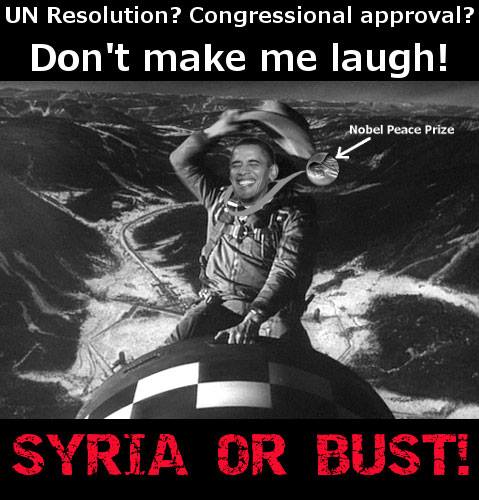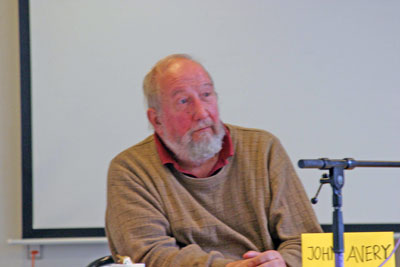Nobel Peace Prize Winner And War Criminal?
By John Scales Avery
05 September, 2013
Countercurrents.org
 In 1946 the United Nations General Assembly unanimously affirmed “the principles of international law recognized by the Charter of the Nuremberg Tribunal and the judgment of the Tribunal”. The General Assembly also established an International Law Commission to formalize the Nuremberg Principles, and the result was the following list.
In 1946 the United Nations General Assembly unanimously affirmed “the principles of international law recognized by the Charter of the Nuremberg Tribunal and the judgment of the Tribunal”. The General Assembly also established an International Law Commission to formalize the Nuremberg Principles, and the result was the following list.
• Principle I: Any person who commits an act which constitutes a crime under international law is responsible, and therefore liable to punishment.
• Principle II: The fact that internal law does not impose a penalty for an act which constitutes a crime under international law does not relieve the person who committed the act from responsibility under international law.
• Principle III: The fact that the person who committed an act which constitutes a crime under international law acted as Head of State or responsible government official does not relieve him from responsibility under international law.
• Principle IV: The fact that a person acted pursuant to order of his Government or of a superior does not relieve him of responsibility under international law, provided that a moral choice was in fact possible for him.
• Principle V: Any person charged with a crime under international law has the right to a fair trial on the facts and law.
• Principle VI: The crimes hereinafter set out are punishable as crimes under international law:
a. Crimes against peace: (i) Planning, preparation, initiation or waging of war of aggression or a war in violation of international treaties, agreements or assurances; (ii) Participation in a common plan or conspiracy for the accomplishment of any of the acts mentioned under (i).
b. War crimes: Violations of the laws or customs of war which include, but are not limited to, murder, ill-treatment of prisoners of war or persons on the seas, killing of hostages, plunder of public or private property, wanton destruction of cities, towns or villages, or devastation not justified by military necessity.
c. Crimes against humanity: Atrocities and offenses, including but not limited to, murder, extermination, deportation, imprisonment, torture, rape, or other inhumane acts committed against any civilian population, or persecutions on political, racial or religious grounds, whether or not in violation of the laws of the country where perpetrated.
• Principle VII: Complicity in the commission of a crime against peace, a war crime, or a crime against humanity as set forth in Principle VI is a crime under international law.
The Nuremberg Principles are being used today as the basis for the International Criminal Court's trials of individuals accused of genocide and war crimes in the former Yugoslavia and elsewhere.
Notice that under Principle III, Heads of State can be prosecuted for war crimes, and that according to Principle IV, a soldier carrying out orders to commit a war crime is also guilty.
Robert H. Jackkson, who was the chief United States prosecuter at the Nuremberg trials stated that “To initiate a war of aggression, therefore, is not only an international crime, it is the supreme international crime, differing from other war crimes in that it contains within itself the accumulated evil of the whole”
Perhaps, before.initiating a war that could escalate uncontrollably into World War III; perhaps before initiating a war that could involve Pakistan's nuclear weapons on the side of Iran and Syria; perhaps before initiating a war that would cause the price of oil to reach unprecidented heights, thus causing a catastrophic global depression; perhaps before initiating a war that could involve Russia and China, staunch allies of Syria; perhaps before initiating a war with no end in sight, President Obama should remember August Pinochet who was indicted for crimes against humanity by a Spanish court, and narrowly escaped extradition from the UK.
Does President Obama really wish to turn himself from a Nobel Peace Prize winner into a war criminal by initiating a world-destroying war? Does he really wish to disgrace his name throughout all future history?
 John Avery received a B.Sc. in theoretical physics from MIT and an M.Sc. from the University of Chicago. He later studied theoretical chemistry at the University of London, and was awarded a Ph.D. there in 1965. He is now Lektor Emeritus, Associate Professor, at the Department of Chemistry, University of Copenhagen. Fellowships, memberships in societies: Since 1990 he has been the Contact Person in Denmark for Pugwash Conferences on Science and World Affairs. In 1995, this group received the Nobel Peace Prize for their efforts. He was the Member of the Danish Peace Commission of 1998. Technical Advisor, World Health Organization, Regional Office for Europe (1988- 1997). Chairman of the Danish Peace Academy, April 2004. http://www.fredsakademiet.dk/ordbog/aord/a220.htm. He can be reached at [email protected]
John Avery received a B.Sc. in theoretical physics from MIT and an M.Sc. from the University of Chicago. He later studied theoretical chemistry at the University of London, and was awarded a Ph.D. there in 1965. He is now Lektor Emeritus, Associate Professor, at the Department of Chemistry, University of Copenhagen. Fellowships, memberships in societies: Since 1990 he has been the Contact Person in Denmark for Pugwash Conferences on Science and World Affairs. In 1995, this group received the Nobel Peace Prize for their efforts. He was the Member of the Danish Peace Commission of 1998. Technical Advisor, World Health Organization, Regional Office for Europe (1988- 1997). Chairman of the Danish Peace Academy, April 2004. http://www.fredsakademiet.dk/ordbog/aord/a220.htm. He can be reached at [email protected]
Comments are moderated

